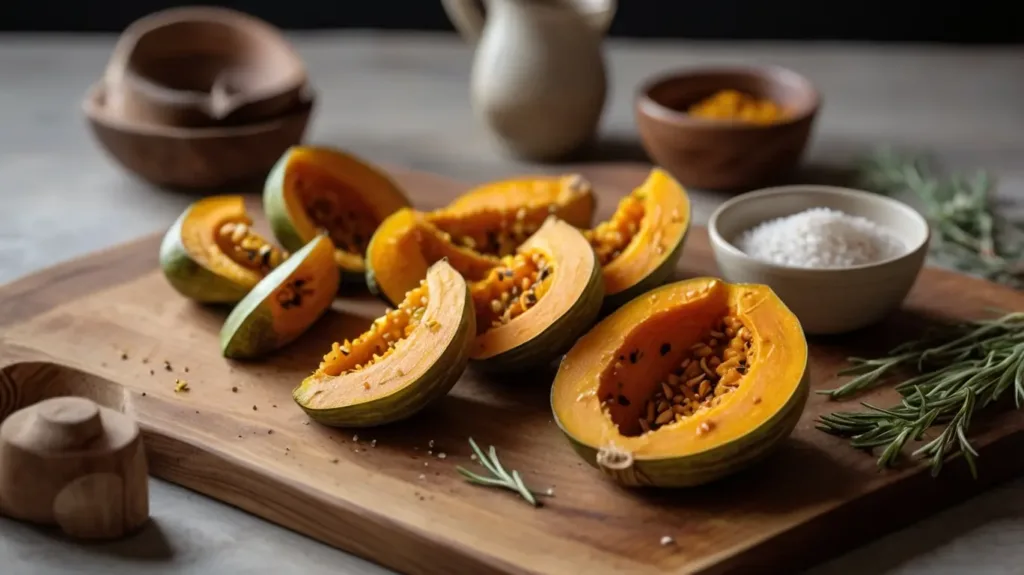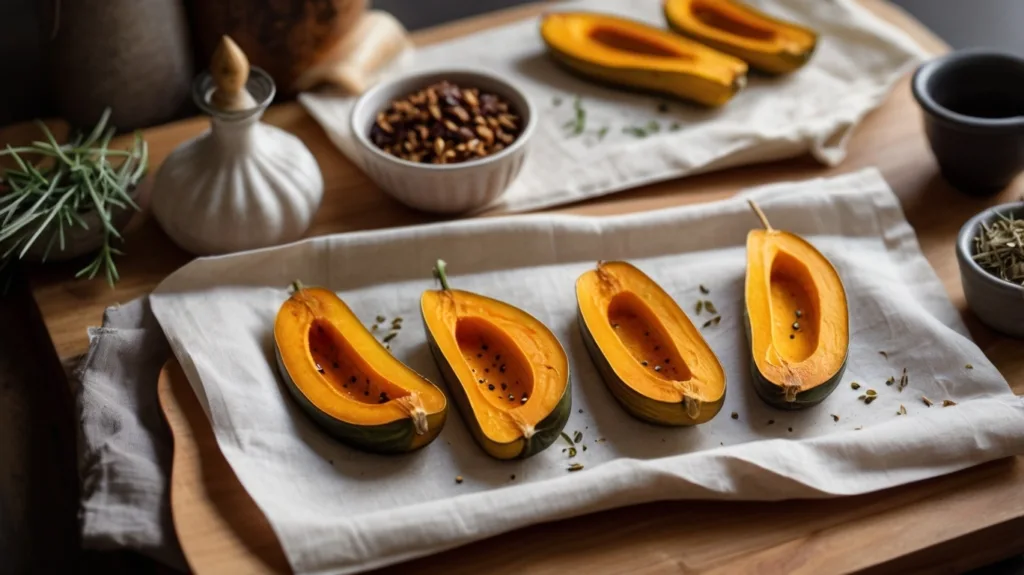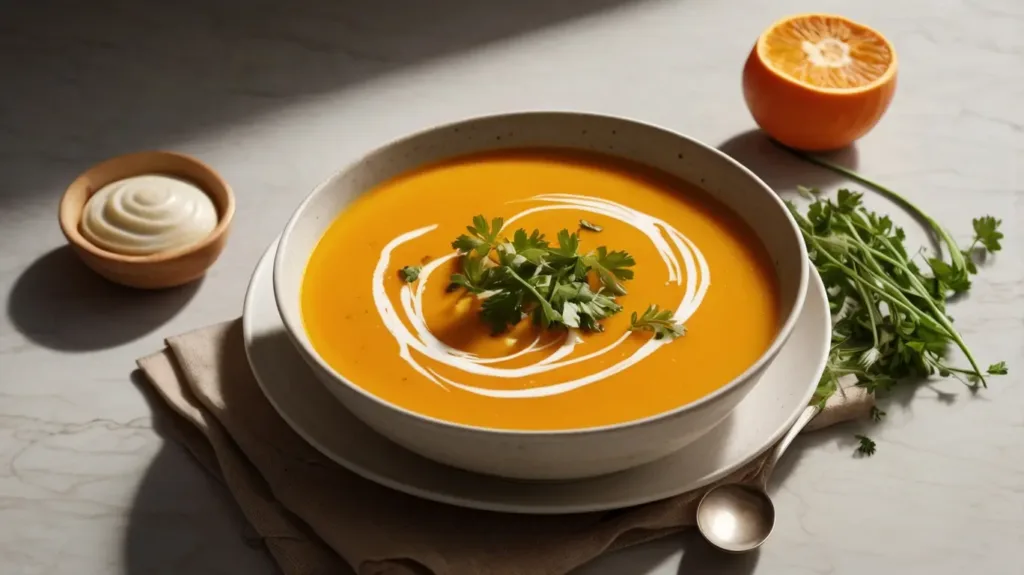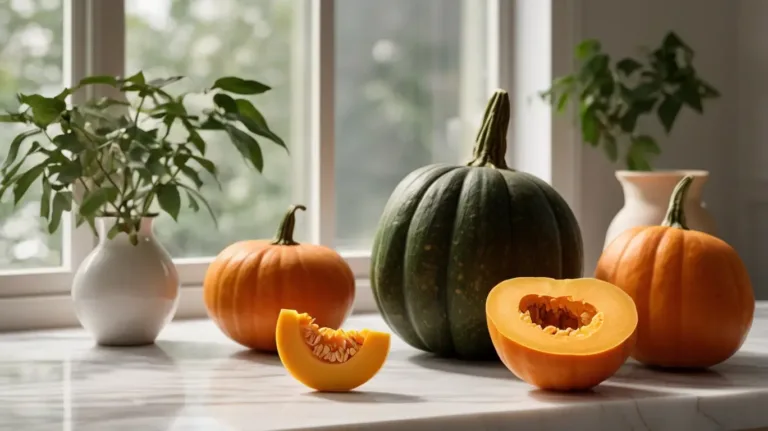Introduction to Kabocha Squash
Kabocha squash, also known as Japanese pumpkin, is a winter squash packed with impressive health benefits. With its vibrant orange flesh and naturally sweet flavor, this versatile squash has become a favorite in kitchens worldwide. Many people are now discovering just how nutritious kabocha squash can be, leading them to ask: what are the key kabocha squash health benefits, and why should it be a staple in your diet?
Praised for its creamy texture and rich nutrient profile, kabocha squash offers countless reasons to enjoy it in your meals. Whether roasted, mashed, or added to soups, this superfood can enhance your health while delighting your taste buds.
What Makes Kabocha Squash Unique?
Kabocha squash stands out not just for its taste but also for its impressive nutrient profile. Unlike other types of squash, kabocha is exceptionally sweet, almost reminiscent of a sweet potato, but with fewer carbs and calories. Its creamy texture makes it perfect for both savory and sweet recipes, giving cooks plenty of creative options.
This squash is also valued for its dense flesh and edible skin. While other squash types often have tough, inedible rinds, kabocha’s thin skin softens during cooking, adding extra nutrients and fiber when eaten. Its natural sweetness and rich flavor make it a favorite for those looking to enhance their meals with wholesome, unprocessed ingredients.
Why People Are Curious About Its Health Benefits
In today’s world, where clean eating and plant-based diets are trending, people are constantly searching for nutritious, satisfying foods to incorporate into their meals, as they explore the health benefits of nutrient-packed foods. Kabocha squash fits the bill perfectly. Its vibrant orange color hints at the high levels of beta-carotene, an antioxidant that promotes skin health and boosts the immune system. This rise in popularity has led many to explore the numerous kabocha squash health benefits, including its immune-boosting nutrients and low calorie content.
Additionally, many people are drawn to kabocha squash for its low-calorie, high-fiber content, which supports weight management. With the growing popularity of superfoods, people are eager to know if kabocha is as healthy as it seems and whether it deserves a spot in the superfood category.
The Rise of Superfoods: Is Kabocha One of Them?
Superfoods are often defined by their high nutrient density and health benefits. Kabocha squash ticks many boxes on this list, boasting an impressive array of vitamins, minerals, and antioxidants. However, what truly sets it apart is its low-calorie count and the fact that it is both nutrient-packed and incredibly flavorful.
Addressing “Is Kabocha Squash a Superfood?”
While the term “superfood” can be subjective, kabocha’s nutrient profile—combined with its versatility and ease of preparation—certainly makes it a strong contender.
How Kabocha Differs From Other Squash Varieties
When comparing kabocha squash to other popular squash types, such as butternut or acorn squash, its differences become clear. Its sweetness is more pronounced, while its texture is smoother and less watery. These qualities make it ideal for creamy soups, purees, or even desserts.
Kabocha vs. Pumpkin: Key Nutritional Differences
Although both kabocha squash and pumpkin share a vibrant orange flesh and sweet flavor, kabocha is denser and slightly sweeter. Nutritionally, kabocha offers more fiber and beta-carotene than pumpkin, making it a better choice for those seeking additional health benefits.
Kabocha Squash Health Benefits: Nutritional Profile & Key Advantages
The Nutritional Breakdown of Kabocha Squash
Kabocha squash is a nutritional powerhouse, and understanding its nutritional profile highlights its many kabocha squash health benefits:
- Calories: 40
- Carbohydrates: 10 grams
- Fiber: 2 grams
- Protein: 1 gram
- Fat: 0 grams
- Vitamin A: 70% of the daily recommended intake
- Vitamin C: 20% of the daily recommended intake
- Potassium: 8% of the daily recommended intake
With its low calorie and high nutrient content, kabocha is a fantastic addition to any healthy diet. Its combination of vitamins and antioxidants supports overall health, from improving skin to boosting immunity.
Key Vitamins and Minerals
Rich in Beta-Carotene and Vitamin C
Kabocha squash owes its bright orange color to beta-carotene, a precursor to vitamin A that supports eye health, immune function, and skin vitality. In addition, its vitamin C content helps reduce inflammation and boosts collagen production, keeping skin firm and youthful. These two nutrients work synergistically to promote a healthy body and glowing complexion.
Low-Calorie, High-Nutrient Profile
For those looking to enjoy satisfying meals without worrying about calorie intake, kabocha squash is a perfect fit. Its nutrient-dense profile allows you to enjoy large portions while staying within your calorie goals.
Macronutrient Composition
Carbs, Protein, and Fiber Content
Kabocha squash provides complex carbohydrates that supply steady energy without spiking blood sugar levels. Its 2 grams of dietary fiber per cup help with digestion and promote satiety, making it a filling choice for meals. Although it’s not a major protein source, its low-fat and low-carb content make it an excellent option for balanced diets.
Fat Content: How It Fits a Low-Fat Diet
One of kabocha squash’s standout features is its negligible fat content. This makes it ideal for low-fat diets while allowing room for healthy fats from other sources like olive oil or nuts to round out a meal.
Is Kabocha Good for Weight Loss?
High Fiber for Satiety
The fiber in kabocha squash helps you feel fuller for longer, reducing the temptation to snack between meals. Fiber slows digestion, which means energy is released gradually, keeping hunger at bay.
Low Glycemic Index and Blood Sugar Control
Kabocha squash has a low glycemic index, meaning it doesn’t cause sudden spikes in blood sugar. This makes it a smart choice for those managing diabetes or trying to maintain stable energy levels throughout the day.
Comparing Kabocha to Other Squash
Which Squash Is the Healthiest to Eat?
When it comes to health benefits, kabocha outshines many other squash varieties. Its superior beta-carotene content and lower calorie count make it a top contender. Butternut squash, acorn squash, and pumpkin each have their own strengths, yet kabocha stands out for its ability to offer sweetness and creaminess without added sugars or fats.
Unique Antioxidant Properties of Kabocha
Beyond beta-carotene and vitamin C, kabocha contains various antioxidants that help neutralize free radicals in the body. This can reduce the risk of chronic diseases like heart disease and certain types of cancer.
Culinary Uses & Tips
Cooking with Kabocha Squash
Kabocha squash is highly versatile in the kitchen, offering countless ways to incorporate it into your meals. Whether you prefer roasting, steaming, or mashing, its naturally sweet and creamy texture adapts well to a variety of cooking methods. Kabocha can be used in savory dishes like soups and casseroles or transformed into a delicious dessert with a touch of cinnamon and maple syrup.
How to Prepare Kabocha Squash

Peeling and Cutting Tips
Preparing kabocha squash can seem intimidating due to its thick skin and firm texture. However, with a few tips, it becomes manageable:
- Choose a Sharp Knife: Use a heavy-duty, sharp knife to cut the squash in half.
- Microwave for Ease: To make it easier to cut, microwave the whole squash for 2–3 minutes to soften kabocha squash before cutting.
- Scoop Out the Seeds: Use a spoon to remove the seeds and stringy pulp. These seeds can also be roasted for a healthy snack.
Once cleaned, you can peel the skin if desired, but remember that the skin becomes tender when cooked and is completely edible.
Cooking Methods: Roasting, Steaming, and More

- Roasting: Slice kabocha into wedges, drizzle with olive oil, and roast in the oven at 400°F for 25–30 minutes until tender.
- Steaming: Place kabocha chunks in a steamer basket over boiling water and cook for about 15 minutes.
- Mashing: Steam or boil the squash, then mash it with butter and spices for a flavorful side dish.
Delicious Recipes Featuring Kabocha
Kabocha Squash Soup Recipe

This creamy soup is perfect for cozy evenings.
Ingredients:
- 1 medium kabocha squash, peeled and cubed
- 1 tablespoon olive oil
- 1 onion, chopped
- 2 garlic cloves, minced
- 4 cups vegetable broth
- 1 cup coconut milk
- Salt, pepper, and a pinch of nutmeg to taste
Instructions:
- Heat olive oil in a pot and sauté onion and garlic until soft.
- Add the cubed kabocha squash and vegetable broth. Bring to a boil, then simmer for 20 minutes.
- Blend the mixture until smooth. Stir in coconut milk and seasonings. Serve warm, a technique perfect for making delicious soup.
Mashed Kabocha with Spices
Mashed kabocha is a delicious alternative to traditional mashed potatoes.
Ingredients:
- 1 medium kabocha squash
- 2 tablespoons butter
- 1 teaspoon cinnamon
- 1/2 teaspoon nutmeg
- Salt and pepper to taste
Instructions:
- Steam or boil the squash until tender, then mash it in a bowl.
- Mix in butter and spices. Adjust seasonings as needed.
How to Pair Kabocha with Other Ingredients
Ideal Seasonings and Flavor Profiles
Kabocha squash pairs well with warm, earthy spices like cinnamon, nutmeg, and ginger. For savory dishes, enhance its flavor with garlic, rosemary, or smoked paprika. A splash of soy sauce or miso can add a delightful umami depth.
Pairing Kabocha with Proteins or Grains
Combine kabocha with lean proteins like chicken, turkey, or tofu for a balanced meal. For grains, it complements quinoa, farro, or wild rice, creating hearty, nutritious dishes. Its natural sweetness also pairs wonderfully with roasted nuts and seeds for added crunch and flavor.
FAQs About Kabocha Squash
Is Kabocha Squash Healthier Than Pumpkin?
Yes, kabocha squash is often considered healthier than pumpkin due to its higher beta-carotene content and lower carbohydrate count. Additionally, it has a creamier texture and richer flavor, making it a favorite among squash lovers.
How Many Calories Are in Kabocha Squash?
One cup of cooked kabocha squash contains approximately 40 calories, making it a low-calorie option for those looking to enjoy nutrient-dense meals.
Is Kabocha Suitable for a Keto Diet?
Yes, kabocha squash can fit into a keto diet in moderation. While it contains some carbohydrates, its fiber content helps reduce its net carb impact, making it a suitable choice for low-carb lifestyles.
Can You Eat the Skin of Kabocha Squash?
Absolutely! Kabocha squash skin is thin and becomes tender when cooked, making it completely edible. This adds extra fiber and nutrients to your meal.
Does Kabocha Squash Have Any Side Effects?
Kabocha squash is generally safe to eat. However, consuming too much can lead to mild digestive issues due to its fiber content, especially for those unaccustomed to high-fiber foods.
Is Kabocha Squash Good for Babies?
Yes, kabocha squash is an excellent food for babies. Its natural sweetness and soft texture make it easy to mash or puree, and it’s packed with essential vitamins like beta-carotene and vitamin C.
Why You Should Add Kabocha to Your Diet
Embracing Seasonal and Nutritious Eating
Kabocha squash is a perfect example of eating seasonally. Available primarily in the fall and winter, it provides a comforting, nutrient-packed option for warming dishes during colder months. Seasonal eating also ensures fresher produce with better flavor and more nutrients.
Kabocha Squash as a Versatile Kitchen Staple
Few ingredients can match the versatility of kabocha squash. It can serve as the star of a dish, a hearty side, or even a base for desserts. With its creamy texture and natural sweetness, it fits seamlessly into countless recipes, offering both health benefits and culinary enjoyment.
Conclusion
In conclusion, kabocha squash is an incredibly healthy and versatile food. If you’re curious about even more benefits, check out this detailed guide on Kabocha squash health benefits.

